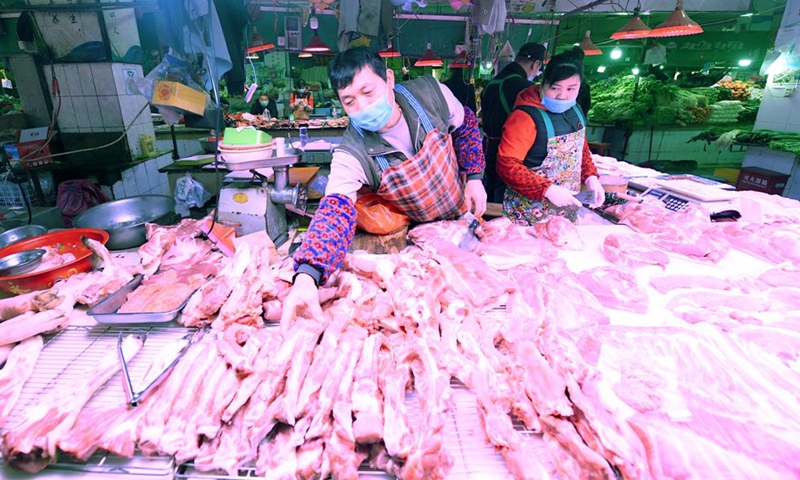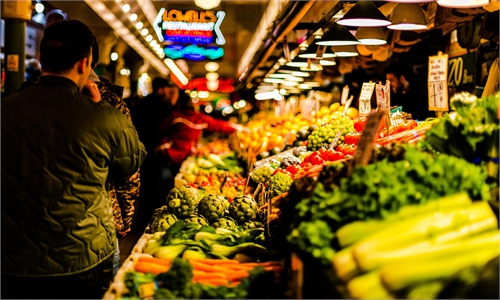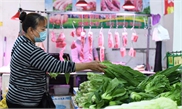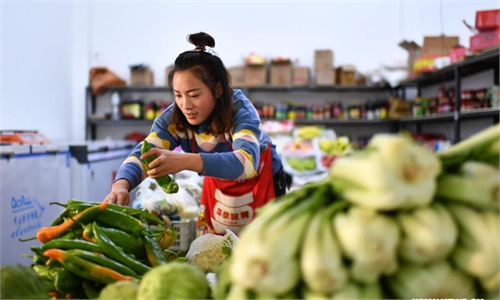
Vendors sell pork at a market in Nanning, south China's Guangxi Zhuang Autonomous Region, Jan. 30, 2020. (Xinhua/Lu Boan)
China's consumer price index (CPI), a main gauge of inflation, rose by 0.2 percent in December year-on-year, compared with November's 0.5-percent drop, and the full-year 2020 rise was 2.5 percent, according to data released by the National Bureau of Statistics (NBS) on Monday.
Consumer demand continued to grow in December as a result of epidemic prevention and control measures and economic growth. At the same time, affected by turbulent weather and rising costs, the CPI shifted from a decline to a rise, said NBS senior statistician Dong Lijuan.
The rebound of the economy and stronger consumption pushed the CPI upward at the end of the year. In particular, the Double 12 online shopping festival and a growing need to spend at the end of the year pushed consumer prices higher, analysts said.
On the monthly basis, CPI moved from a 0.6 percent decline to an increase of 0.7 percent in December. Among the main drivers, food prices moved from a 2.4-percent drop in November to an increase of 2.8 percent, which contributed about 0.62 percentage points to the CPI, said Dong.
The rise in the CPI was mainly driven by higher pork prices, Nomura said in a report it sent to the Global Times on Monday. "Seasonally stronger pork demand toward year-end (especially amid the services sector recovery), tighter regulations for hog shipments across different regions in China, and limited pork imports due to the worsening COVID-19 situation in overseas economies may have jointly contributed to sequentially higher pork prices in December from November,�?read the report.
Pork prices rose 6.5 percent, compared with a 6.5-percent drop in November, driving the CPI up by 0.28 percentage points, according to the NBS.
Prices for vegetables and fruit rose 6.5 percent year-on-year in December, while beef and mutton prices rose 4.6 percent.
For all of 2020, the CPI rose 2.5 percent year-on-year, down from 2.7 percent in the first 11 months and staying within the government's annual target of around 3.5 percent.
The producer price index (PPI), which measures factory-gate prices, was down 0.4 percent in December, narrowing from the 1.5-percent drop in November.
In December, the steady recovery of domestic demand, coupled higher prices for some international bulk commodities, pushed industrial product prices up further, Dong said.
In 2021, inflation will likely stay within a narrow range, with economic growth to further accelerate and lead the global economy, said a 2021 outlook report Standard Chartered sent to the Global Times.
The December inflation data, especially after adjusting for pork prices, suggest neither significant inflation nor deflation risks. "We believe Beijing will carry out a moderate normalization in 2021 following stimulus measures in 2020,�?said Nomura.
However, analysts warned of uncertainties, with sporadic COVID-19 outbreaks in certain Chinese cities and the spread of the pandemic overseas.
"The travel, transportation and catering industries will undergo another round of disruption if local authorities restrict movement during the holiday season,�?Dong Dengxin, director of the Financial Securities Institute at Wuhan University of Science and Technology, told the Global Times.
If the coronavirus situation worsens, it will be a drag on CPI and GDP growth, Dong said.
A resurgence of the coronavirus and the re-introduction of much stricter social distancing rules, especially in North China, could suppress demand during the lunar new year holidays, while increased travel restrictions could also reduce supply, said Nomura.




